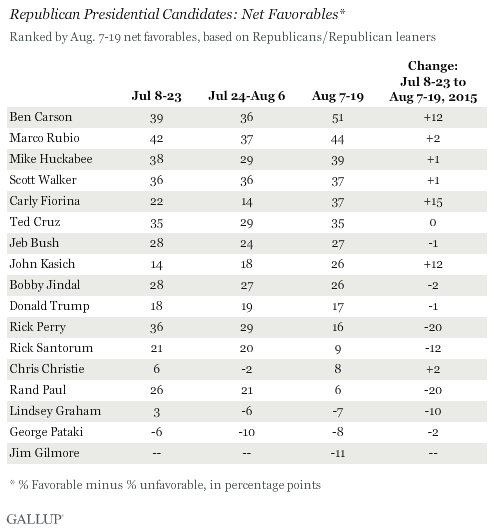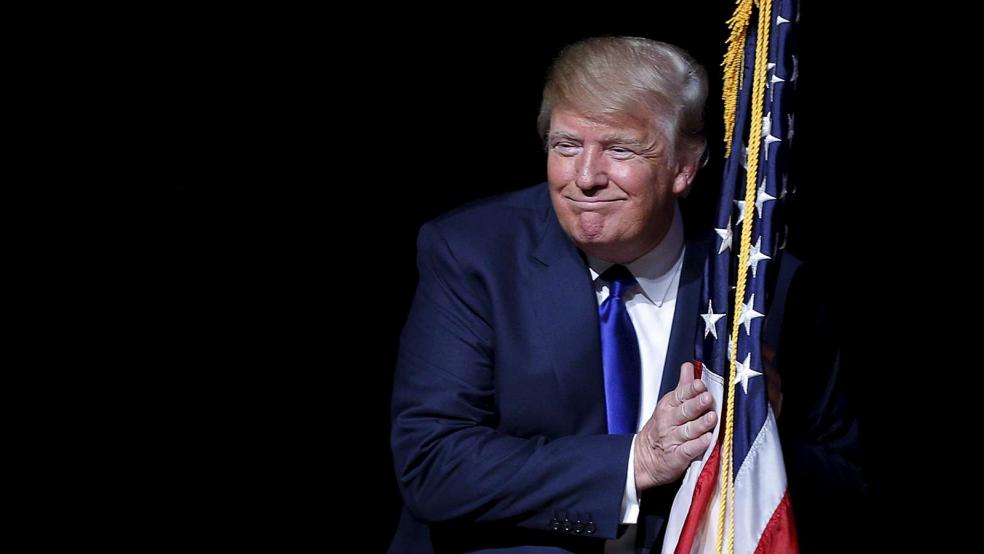There’s little doubt that the first Republican debate had a huge impact on the public’s perception of the GOP presidential candidates.
The conventional wisdom is that Ohio Gov. John Kasich, former Hewlett-Packard CEO Carly Fiorina and former neurosurgeon Ben Carson made the most of their performances in the debates in Cleveland, while former Texas governor Rick Perry and Sens. Rand Paul of Kentucky and Lindsey Graham of South Carolina lost ground.
The net favorable ratings of those six candidates tracked by Gallup over a 13-day period following the debates confirms that view. Net approval ratings are the difference between a candidate’s positive and negative ratings in the polls.
Related: Trump: ‘I’ve Gained Such Respect for the People That Like Me’
Kasich, a late entrant in the campaign who is portraying himself as a more compassionate conservative, saw a 12-point rise in his net approval rating in the polls compared with a previous two-week period. The net approval of Fiorina jumped by 15 points, while Carson’s rose by 12 points – making him the most popular candidate in the field.
By contrast, Perry and Paul both suffered 20-point drops in their net approval ratings after the debate, while Graham saw his fall by 10 points. Perry once again showed himself to be a weak debater, while a combative Paul lost ground after directly clashing with frontrunner Donald Trump and New Jersey Gov. Chris Christie.
Trump dominated the debate with his fiery exchanges with Fox News moderator Megyn Kelly and his self-confident stands on issues ranging from the economy and the debt to immigration and the war on ISIS. His net approval rating dipped by one point after the debate.
The Gallup analysis by editor-in-chief Frank Newport found that Trump's image among Republicans has remained “remarkably constant” since the debate, despite saturation news coverage of his controversial remarks over the past two weeks or so.
Related: Clinton Fades as Biden Runs Strong in Swing States
In the latest survey, 55 percent of Republicans said they had a favorable view of Trump while 38 percent said they had an unfavorable opinion -- a net 17 point favorability rating. That puts the Republican presidential frontrunner slightly below the average favorability ratings of all the candidates.
By comparison, former Florida governor Jeb Bush has a net favorable rating of 27 percent, or just a bit above the average, while Christie has one of the lowest net ratings at just eight points.

Gallup says that Trump’s situation is the most fascinating – and potentially perilous – of many of the top-tier candidates. Although he is leading in the polls nationally by an average of 22 percent of Republican voters according to Real Clear Politics, and enjoys a 90 percent name identification, his overall net favorable score remains “anemic.”
Precisely what Trump’s continued high unfavorable ratings might mean next year is impossible to guess at this point, although analysts have learned that it is unwise to underestimate the billionaire’s political instincts and tactics.
Related: Walker Looks for a Trump Bump as He Takes on Immigration
Trump’s “upside potential” for building on his popularity may prove to be more limited than for someone like Florida Sen. Marco Rubio, according to the analysis. Rubio is less well known than Trump right now, but he has only a third of Trump’s “unfavorables.”
“The fact that many Republicans have an unfavorable opinion of Trump is a possible indicator that there are lurking negatives about his candidacy that could spread to other rank-and-file Republicans who now are favorable toward him,” Newport wrote.





